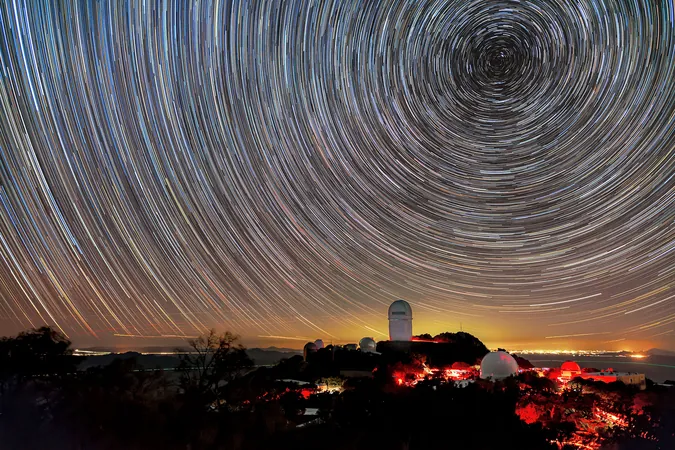
Shocking New Findings from Global Dark Energy Study Challenge Our Understanding of the Universe
2025-03-26
Author: Wei Ling
Shocking New Findings from Global Dark Energy Study Challenge Our Understanding of the Universe
Cutting-edge research from the Dark Energy Spectroscopic Instrument (DESI) collaboration, which includes prominent scientists from Harvard University, has sparked a monumental debate in cosmology. The fresh data indicates that dark energy, previously thought to be consistent over time—often referred to as a "cosmological constant"—may actually be weakening. This revelation has the potential to upend the prevailing model of our universe’s workings.
At the heart of the universe's future is the complex interplay between matter and dark energy, the enigmatic force believed to be propelling the universe's accelerating expansion. By meticulously charting how matter is distributed across the cosmos, DESI has provided an unprecedented view of dark energy's influence over a staggering 11 billion years.
This groundbreaking analysis leverages the largest three-dimensional map of our universe ever created, utilizing data collected during the first three years of DESI's operation. As announced in a press release by the Lawrence Berkeley National Laboratory, these findings are poised to redefine our understanding of cosmic evolution.
Crucial to this analysis are patterns from the universe's early moments, known as Baryon Acoustic Oscillations. These oscillations provide a cosmic “ruler,” with their size altered by the expansion dynamics of the universe. By measuring this cosmic ruler at various distances, researchers can gauge the intensity of dark energy through different epochs, reinforcing the idea that its influence might not be static.
The DESI initiative comprises over 900 researchers across more than 70 institutions globally, managed by the U.S. Department of Energy’s Berkeley Lab. The collaboration's findings have been shared in an array of academic papers, now available on arXiv, and were recently highlighted at the American Physical Society's Global Physics Summit in Anaheim, California.
Aside from unveiling its latest dark energy insights, the DESI collaboration has made its Data Release 1 accessible to the public, offering a treasure trove of data on millions of celestial objects. This dataset is set to enhance myriad astrophysical studies at institutions like the Center for Astrophysics | Harvard & Smithsonian (CfA).
Leading the charge in this significant cosmological research are Harvard Professor Daniel Eisenstein and his team, who have contributed to algorithm development and simulations pivotal to the DESI's success. Key figures such as Cristhian Garcia Quintero, Michael Rashkovetskyi, and Claire Lamman have also played essential roles by steering the project's scientific interpretations, critical calculations, and public outreach efforts.
The implications of this discovery are staggering—if dark energy is indeed evolving, it could fundamentally alter theories about the universe's fate, opacity, and our understanding of fundamental physics. Astrophysicists at CfA are already leveraging DESI data to delve deeper into not just dark energy, but also the evolution of galaxies, the cosmic web, and the intricate structure of our Milky Way.
As the DESI survey continues its nightly endeavors, astronomers are increasingly captivated by the unfolding narrative of the universe, sparking both excitement and philosophical ponderings about our place in the cosmos. Could this be the dawn of a new era in cosmology? The answers lie in the stars, and the journey of discovery has only just begun. Stay tuned for more revelations as scientists piece together the intricacies of dark energy and the universe itself!




 Brasil (PT)
Brasil (PT)
 Canada (EN)
Canada (EN)
 Chile (ES)
Chile (ES)
 Česko (CS)
Česko (CS)
 대한민국 (KO)
대한민국 (KO)
 España (ES)
España (ES)
 France (FR)
France (FR)
 Hong Kong (EN)
Hong Kong (EN)
 Italia (IT)
Italia (IT)
 日本 (JA)
日本 (JA)
 Magyarország (HU)
Magyarország (HU)
 Norge (NO)
Norge (NO)
 Polska (PL)
Polska (PL)
 Schweiz (DE)
Schweiz (DE)
 Singapore (EN)
Singapore (EN)
 Sverige (SV)
Sverige (SV)
 Suomi (FI)
Suomi (FI)
 Türkiye (TR)
Türkiye (TR)
 الإمارات العربية المتحدة (AR)
الإمارات العربية المتحدة (AR)